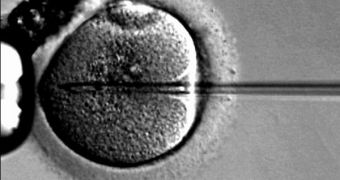Once fertility treatments are completed, many embryos remain frozen, a byproduct of women's treatment options, which include the possibility of preserving eggs if regular therapies fail. The logic behind this is for patients to be able to have children, even if through in-vitro fertilization. But most women have no plans for their embryos once their treatment is complete.
They don't want to simply throw them away, but a recent survey shows that they don't want to donate them to other women either. Of the existing options, which include donating the frozen eggs for science and stem cell research, complete disposal or offering them to other potential moms, who are unable to have children, women seem more inclined (about 20 percent) to choose the first alternative. But the other two options seem unbearable to them.
"For many of these patients, the need to make a decision about disposing these embryos is not discussed up front. Understandably, fertility patients have hard times thinking about destroying their embryos when they are emotionally and financially invested in trying to make a baby. Either the options they prefer aren't available or they are unacceptable," says Anne Drapkin Lyerly, MD, obstetrician/gynecologist and bioethicist at Duke University Medical Center, who is also the lead investigator of the new study, appearing on-line in the journal Fertility & Sterility.
After a uniquely large study on the matter, on over 1,000 fertility patients all around the US, she concluded that some 70 percent of all women who have eggs in storage prefer to put off having to decide on their faith for 5 years or more, rather than make a decision sooner. However, this may not be a possibility for a long time, as many state authorities, and even the federal government, plan to pass legislations that will decide the status of these frozen embryos.

 14 DAY TRIAL //
14 DAY TRIAL //